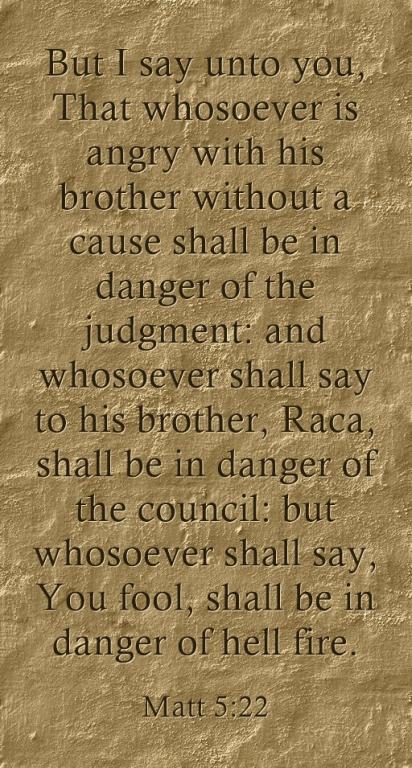What does the word “Raca” mean when Jesus uses it in the Bible? What are the implications for Christians today?
A Definition of “Raca”
The word “raca” is Arabic and is a term of reproach used by the Jews of our Savior’s time on earth and means “worthless.” The word “raca” is sometimes translated as “fool” or “useless” and even rendered “cursed” or “empty headed” so using this word in anger against someone places them on dangerous ground according to Jesus (Matt 5:22). There is also a town in Serbia called “Raca” and it’s also the name of a river in Slovenia and even a borough of Bratislava, Slovakia as well as a village in East Timor in the Lospalos district but when used in the Bible, this is not talking about a location but is used either as a noun or an adjective and it is one of the most offensive things that someone could be called in Judea at the time of Christ’s earthly ministry. Even today, calling someone a fool, useless or cursed is also one of the greatest insults that can be hurled against anyone. God never hesitates to use this in the proper context like in Psalm 14:1 which says “The fool says in his heart, “There is no God.” They are corrupt, they do abominable deeds, there is none who does good.”
The Foolishness of Denying God
Paul writes about the foolishness of denying the existence of God in Romans 1:19-20 where he writes “what can be known about God is plain to them, because God has shown it to them. For his invisible attributes, namely, his eternal power and divine nature, have been clearly perceived, ever since the creation of the world, in the things that have been made. So they are without excuse.” Even though “they knew God, they did not honor him as God or give thanks to him, but they became futile in their thinking, and their foolish hearts were darkened. Claiming to be wise, they became fools, and exchanged the glory of the immortal God for images resembling mortal man and birds and animals and creeping things” (Rom 1:21-23). That’s why “the wrath of God is revealed from heaven against all ungodliness and unrighteousness of men, who by their unrighteousness suppress the truth” (Rom 1:18). The Greek word for “suppress” is “katechō” and this word means “to hold back, to detain,” and “to restrain” so they are intentionally suppressing the knowledge of God’s existence and that’s why they have no real excuse (Rom 1:20). Calling someone who denies God a fool is true given the reason that they’re suppressing the knowledge of God and are without any real excuse for they really know, deep down, that God does exist.
In Danger of Judgment
Jesus gives a stern warning to those who call other people a fool because it really means useless or cursed and some Bibles translate it as “empty headed.” We read of this account in Matthew 5:22 where Jesus warns “But I say to you that everyone who is angry with his brother will be liable to judgment; whoever insults his brother will be liable to the council; and whoever says, ‘You fool!’ (or “raca” in Aramaic) will be liable to the hell of fire.” Who was Jesus speaking to when He said this? Was it only the disciples? Was He saying this to the scribes, Pharisees, or the Sadducees? No, He was addressing “the crowds, he went up on a mountainside” as well as His disciples (Matt 5:1) so this applies to everyone, everywhere, and for all time. Notice that Jesus never said that anyone who called someone a fool was already judged but they were “liable to judgment.” He never said that they are damned to hell fire but they “will be liable to the hell of fire” unless they repent of this. Everyone loses their temper at times but the context of the way in which the Greek structure of this sentence is written means that someone that continues to call someone or others this name as a pattern or as a way of life. He isn’t saying that someone who loses their temper and calls someone a fool is judged to hell but they are in danger if this is their way of dealing with people on an everyday basis.
Conclusion
It is the height of folly to deny God’s existence for the Bible says that “every eye will see him” (Rev 1:7) and “all the peoples of the earth will mourn when they see the Son of Man coming on the clouds of heaven, with power and great glory” (Matt 24:30). For those who already trust in Christ they won’t mourn but rejoice; the ones who will mourn will be those who finally know that God does it exist but this knowledge will come too late to save them. God says “every knee shall bow to me, and every tongue shall confess to God. So then every one of us shall give account of himself to God” (Rom 14:11-12) and truly, “at the name of Jesus every knee should bow, in heaven and on earth and under the earth” (Phil 2:10) and whether they believe it or not doesn’t matter. Just because someone doesn’t believe this or believe in God, doesn’t mean that He’s not real. Whether you believe in something or not doesn’t change whether it is true.
Article by Jack Wellman
Jack Wellman is Pastor of the Mulvane Brethren church in Mulvane Kansas. Jack is also the Senior Writer at What Christians Want To Know whose mission is to equip, encourage, and energize Christians and to address questions about the believer’s daily walk with God and the Bible. You can follow Jack on Google Plus or check out his book Blind Chance or Intelligent Design available on Amazon.












